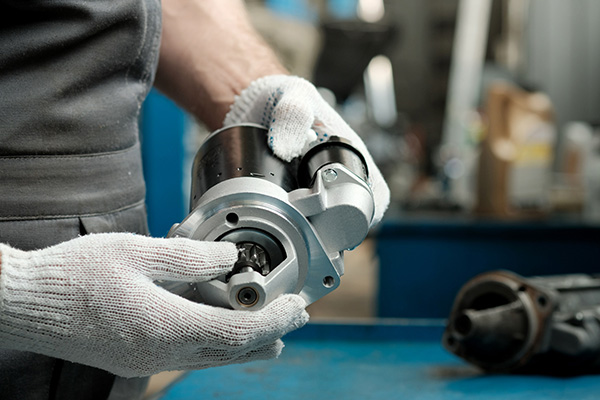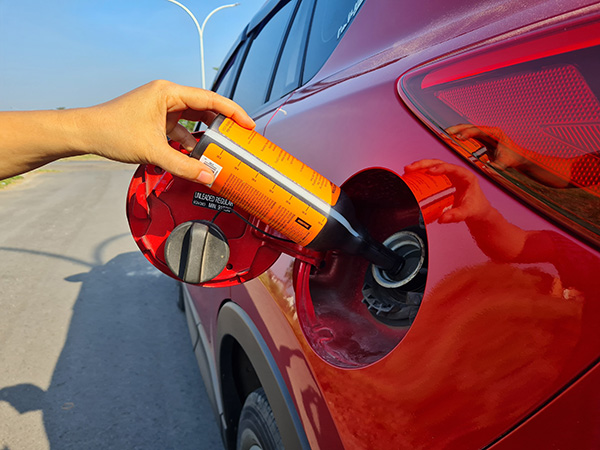Posted on 12/20/2024

Winter weather brings a unique set of challenges for car owners, especially when temperatures dip, snow accumulates, and icy roads become a regular occurrence. Properly winterizing your vehicle not only ensures that it runs efficiently in harsh conditions but also helps avoid potential breakdowns during the colder months. To help you keep your car in top shape, here are some essential winterizing tips for your vehicle. Tip 1. Check Your Battery Cold weather can significantly affect your car battery’s performance. As temperatures drop, the chemical reactions within your battery slow down, which can reduce its ability to start your engine. A weak battery is more likely to fail during the winter, especially if you rely on your car for daily commuting. What to do: Have your battery tested to check its charge and overall health. If your battery is older than three years, it might be time for a replacement. Clean any corrosion from the battery terminals and ensure t ... read more
Posted on 11/29/2024

The holidays are a magical time, and decorating your car for Christmas can be a fun way to join the celebration. Whether you’re heading to a family gathering, participating in a festive parade, or just spreading cheer on your daily commute, dressing up your vehicle adds a unique twist to the season. But with so many options out there, how do you choose the best decorations that suit your style and your car? Balancing Festivity with Functionality Decorating your car for Christmas isn’t just about creativity—it’s also about being practical. The best decorations enhance the holiday vibe without interfering with your driving. Over-the-top or poorly secured items can cause distractions or damage, so it’s necessary to strike the right balance. Start with decorations that are car-friendly, like magnetic signs, vinyl wraps, or window decals. These items are easy to apply and remove, ensuring you don’t end up with scratches or sticky resid ... read more
Posted on 10/31/2024

Your car’s engine relies on several essential components working together, and one critical piece that often goes overlooked is the belt system. Whether it’s a serpentine belt or a timing belt, these belts play a crucial role in keeping your engine running efficiently. But what happens when these belts begin to wear and crack? Could a simple crack in your belt lead to engine trouble? 1. The Role of Engine Belts In most cars, you’ll find either a serpentine belt or a timing belt—or both. The serpentine belt powers various systems, including the alternator, power steering, and air conditioning. On the other hand, the timing belt synchronizes the camshaft and crankshaft, ensuring that your engine’s valves open and close at the right times. These belts are made from durable materials like rubber, but even the toughest belts wear down over time due to heat, friction, and age. As the belt ages, it can develop cracks, fraying, or even snap ent ... read more
Posted on 9/27/2024

There’s nothing more frustrating than hopping into your car, turning the key, or pressing the start button and being met with silence or strange sounds. Whether rushing to work or heading out on a trip, a car that won’t start can throw off your whole day. But before you panic, know that this is a common issue, and it doesn’t always mean your car is out of commission. There are a few things you can check and try to potentially fix the problem or identify the cause. Check the Battery The most common culprit when your car won’t start is a dead or weak battery. If you notice that the lights are dim or not turning on at all, it’s likely the battery is the issue. Even if your lights do come on, your battery might not have enough power to turn over the engine. Here’s what you can do: Jump-Start the Car Use jumper cables to conn ... read more
Posted on 8/30/2024

Hybrid cars have become increasingly popular as more people look for eco-friendly alternatives to traditional gasoline-powered vehicles. With the promise of better fuel efficiency and reduced emissions, hybrid cars offer a compelling option for environmentally-conscious drivers. But one question often arises for potential hybrid owners: Do these vehicles require special maintenance compared to regular cars? The Hybrid Car System Before we get into the maintenance specifics, it's essential to understand what makes a hybrid car unique. Hybrid vehicles combine an internal combustion engine with one or more electric motors. The electric motor can power the car on its own at lower speeds or work alongside the engine to improve fuel efficiency. This dual power system is the main feature that differentiates hybrid cars from regular gasoline vehicles. Because of this dual system, hy ... read more
Posted on 7/26/2024

When you slide behind the wheel of your car, do you ever consider the engineering marvels that work silently to keep you safe? Among these, the airbag system stands out as a crucial component. While it may seem like a simple inflatable cushion, its role in safeguarding lives during collisions is nothing short of extraordinary. Why Airbags Are Essential for Safety Airbags are not just an added feature—they are a fundamental part of your vehicle's safety system. Since their introduction, airbags have dramatically improved the safety of car occupants. They are designed to deploy in the event of a significant impact, providing a cushion that reduces the risk of severe injuries. This rapid response can mean the difference between life and death, turning a potentially fatal accident into a survivable one. How Airbags Work Understanding how airbags function can deepen your appreciation for this lifesaving technology. The system consists of senso ... read more
Posted on 6/27/2024

Choosing the right spark plugs for your car can seem like a daunting task, especially with the variety of options available on the market. Spark plugs are small but crucial components that play a significant role in your vehicle's performance. They ignite the fuel-air mixture in your engine, powering your car. But not all spark plugs are created equal. We'll explore the different types of spark plugs and help you determine which one is best for your vehicle. Understanding Spark Plugs Before discussing the different spark plug types, we must explain their basic function. Spark plugs deliver electric current from the ignition system to the combustion chamber, igniting the compressed fuel-air mixture. This ignition process powers your car, and the type of spark plug you use can influence its effectiveness and efficiency. Copper Spark Plugs Copper spar ... read more
Posted on 5/29/2024

When it comes to maintaining and repairing your vehicle, choosing the right auto repair service is crucial. While there are many options available, local auto repair shops offer several advantages that make them a preferred choice for many car owners. Convenience and Accessibility One of the primary advantages of local auto repair services is their convenience and accessibility. Unlike large chain repair shops, local establishments are often situated closer to residential areas, making them easily accessible for customers. This proximity saves time and effort, especially during emergencies or for routine maintenance tasks. Personalized Service Local auto repair shops prioritize building long-term relationships with their customers. As a result, they often provide more personalized service tailored to individual needs. Customers can expect to receive attentive care, honest recommendations, and a higher level of attention to detail from local mechani ... read more
Posted on 4/28/2024

In today's automotive market, fuel additives are widely promoted as miracle solutions to improve fuel efficiency, boost engine performance, and even extend the lifespan of your vehicle. But do these products really live up to the hype? Are they worth the investment, and how often should you use them? Fuel Additives: What Are They and How Do They Work? To understand whether fuel additives are beneficial, it's crucial to know what they are and how they function. Fuel additives are chemical compounds designed to enhance the quality and performance of gasoline or diesel fuel. They typically contain a combination of detergents, lubricants, stabilizers, and octane boosters, each serving a specific purpose in improving fuel combustion and engine operation. Improved Fuel Efficiency: Separating Fact from Fiction One of the primary claims mad ... read more
Posted on 3/21/2024

The brake system is one of the most critical safety components of any vehicle, responsible for slowing or stopping the vehicle when needed. Composed of various components including brake pads, rotors, calipers, and brake fluid, the brake system operates under a wide range of conditions, including different weather patterns. As a responsible driver, you should be informed on how weather affects the brake system. That way, you can anticipate potential issues and maintain optimal brake performance year-round. 1. Heat and Cold Extremes Extreme temperatures, whether hot or cold, can have a significant impact on the performance of your vehicle's brakes. In hot weather, prolonged braking or driving in stop-and-go traffic can lead to brake fade, where the brake pads and rotors become overheated and lose their effectiveness. Conversely, in cold weather, the brake fluid m ... read more